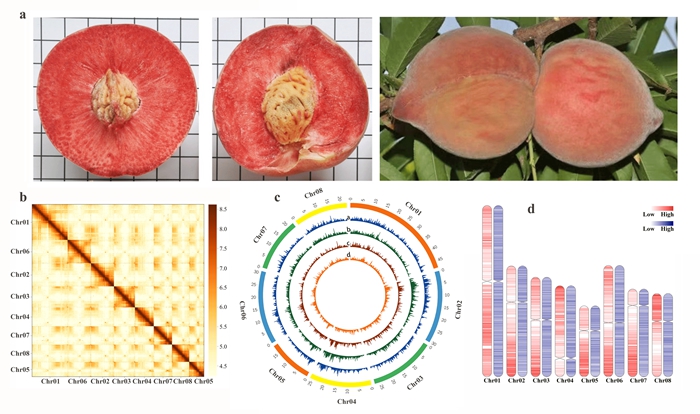The co-variation between blood flesh and maturity period in peach was revealed
Recently, the researchers from Zhengzhou Fruit Research Institute used the technology of combining genomics and molecular biology to assemble the genes of the blood-flesh peach variety, ‘Tian Jin Shui Mi’ (TJSM), discovered the key genes and genetic variation mechanisms of blood-flesh peach, and clarified the characteristics and maturity of blood-flesh peach. The molecular mechanism of synergistic variation during this period laid the foundation for diversified blood-flesh peach breeding. The results were published in Horticulture Research .
The assembled the genome of a blood-fleshed peach Chinese landrace TJSM and found that the genome size of TJSM was 243.5Mb, compared with the reported peach genomes, the TJSM genome had the largest number of specific structural variants (SVs) and long terminal repeat-retrotransposons (LTR-RTs). A transposon blood TE was found in the promoter of the major blood-flesh gene PpBL , which is a key mutation in the formation of blood-flesh. The blood TE was not only co-separated with the blood-flesh phenotype but also associated with different intensities of blood-flesh color formation. In addition, the blood TE also associated with fruit maturity date advancement, for example, varieties with a key genotype for late maturation show a mid-ripening phenotype, while most varieties with a key genotype for mid-ripening show early maturation, revealing the cooperative variation mechanism between peach blood-flesh color and maturity period.

By Li Yong
liyong02@caas.cn
-
 Apr 18, 2024Opening Ceremony of the Training Workshop on Wheat Head Scab Resistance Breeding and Pest Control in Africa Held in CAAS
Apr 18, 2024Opening Ceremony of the Training Workshop on Wheat Head Scab Resistance Breeding and Pest Control in Africa Held in CAAS -
 Apr 03, 2024IPPCAAS Co-organized the Training Workshop on Management and Application of Biopesticides in Nepal
Apr 03, 2024IPPCAAS Co-organized the Training Workshop on Management and Application of Biopesticides in Nepal -
 Mar 28, 2024Delegation from the School of Agriculture and Food Science of University College Dublin, Ireland Visit to IAS, CAAS
Mar 28, 2024Delegation from the School of Agriculture and Food Science of University College Dublin, Ireland Visit to IAS, CAAS -
 Mar 25, 2024Director of World Food Prize Foundation visited GSCAAS
Mar 25, 2024Director of World Food Prize Foundation visited GSCAAS -
 Mar 20, 2024Institute of Crop Sciences (ICS) and Syngenta Group Global Seeds Advance Collaborative Research in the Seed Industry
Mar 20, 2024Institute of Crop Sciences (ICS) and Syngenta Group Global Seeds Advance Collaborative Research in the Seed Industry
